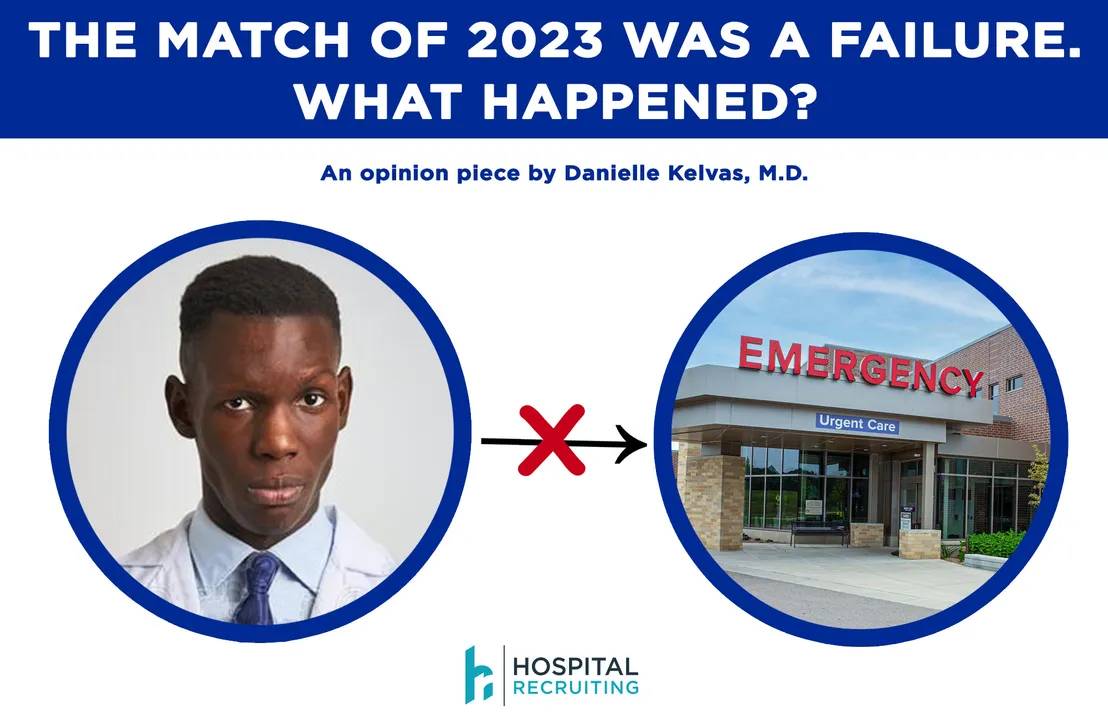The Match of 2023 was an Overall Failure. What Happened?

Editor's Note: The opinions expressed in this article are those of the author and do not necessarily reflect the views of HospitalRecruiting. The information provided is for general informational purposes only and should not be relied upon as professional advice.
Historical Context
Before I tell all, a bit of history. If you already know this, then skip to the next section.
The NRMP Match is a process by which medical students and residency programs agree to work together, allegedly. The match occurs annually in March when students rank the programs they'd like to work at, and those programs rank their preferred applicants.
This is a legally binding agreement. Wherever the algorithm matches you, you must work there as a resident physician.
You can watch this " target="_blank" rel="noopener noreferrer">video for the specifics.
You then have an exhilaratingly stressful 1.5 - 2 months after graduating medical school to upend your entire life and family and move somewhere in the United States. Essentially wheel of fortune. For as flawed as this system is, it’s most certainly an upgrade from ancient times, where hundreds of pages of applications traveled via snail mail.
Is The Match Stealing from Medical Students?
To electronically send documents, it costs:
- $70 to register
- $30 per program above the 20-program cut-off limit.
- $45 extra when you match as a couple. (Yes, you get pinned because you want to stay with your spouse. Match rates for couples decreased this year.)
- Hundreds of additional dollars if you rank over 100 programs.
- You cannot match unless you have paid in full.
- If your credit card is declined, you are withdrawn from the match and barred from ever participating in the match again.

Image originally published at https://annualreport.nrmp.org/
(Data from last year because this year isn’t published yet)
Half of NRMP’s income pays for personnel salary and benefits. The entire NRMP staff works remotely, per the annual report.
- The net percentage of PGY-1 positions filled decreased from last year.
- The number of U.S. MD seniors applying and filling PGY-1 spots decreased significantly but increased for DO and non-U.S. citizen international students (IMG).
- 236 graduating senior MD students didn’t even register for the match.
- This past year saw 183 new programs, but many of them were sponsored by contract management groups (so not competitive residencies, usually at community hospitals).
- Certified residencies filled to 86.6%, a decrease from last year.
- Emergency medicine had a staggering decline, with 554 open positions.
The NRMP saw a marked increase in applications and positions, so financially this is a win for them, but clearly, the numbers do not show a win for medicine.
Watching ERs go understaffed and stuffed to the brim with admission times of days understandably deterred students. Mid-level providers gain new freedoms every day, regularly staffing ERs without MD oversight.
Contract management groups (CMGs) created over a hundred new, noncompetitive EM residencies at community hospitals. The results for EM are not a surprise, despite ACEP acting clueless in their joint statement.
This was predicted over 2 years ago by the resident and medical student associations EMRA (now called AAEM/RSA).
Primary care positions filled at the same rate as they did last year, despite a serious, growing shortage of PCPs.
This steady decline in the NRMP match results is likely predicting worse trends in future years.
What you can do as a Resident:
- As a senior, take an administrative elective if possible.
- Specialize in something where a mid-level provider or artificial intelligence bot could not eventually perform most of your job.
- Ask your seniors regularly about their job options, interviews, and negotiation strategies.
- Moonlight as soon as possible in as many different locations as possible.
- Never underestimate the value of developing a side gig. Start educating yourself in business and financial principles.
What you can do as a Medical Student:
- Stay abreast of political and legislative changes regarding your desired specialty. For example, right now is a terrible time to be a reproductive OB/GYN specialist.
- Review job boards regularly. Don’t just ask your attendings; instead, look at what jobs in your desired field offer in their contracts.
- Start saving for the match early. Expect to hand over a fortune and avoid credit card debt as much as possible.
- Shadow and rotate in as many different places and locations as possible to get a good sense of your specialty. For example, my emergency medicine rotation in Orlando, FL was drastically different than my experience in Albuquerque, NM.
While the NRMP does provide numerous safeguards for residency programs and medical students, the declining numbers and exorbitant costs demonstrate that this is just another brilliant business scheme to bottleneck vulnerable student doctors.
The National Resident Matching Program (NRMP) is an organization that matches medical students to residency programs. The process begins with a list of all applicants who have applied for a particular specialty and their preferences for where they would like to be matched. Then, the program uses an algorithm to match each applicant with a residency program based on location, specialty choice, and other factors.
Related Posts
